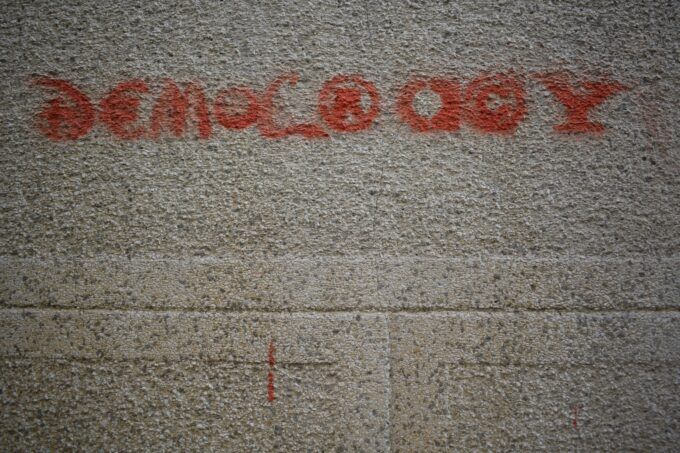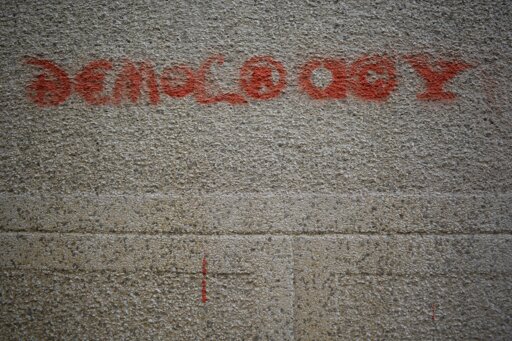
Image by Marija Zaric.
As you read the title, anyone with a sharp eye for spelling or a love of language is probably scratching their head and asking, “What the devil is ‘Orteganization’?” No need to Google it or dust off your old Webster’s, if you still have one. It’s a term I coined to describe the creeping autocratic tint the United States seems to be adopting, one day, one law, one norm at a time, echoing the playbook of Nicaraguan strongman Daniel Ortega.
Once seen as a revolutionary hero, Daniel Ortega has turned Nicaragua into one of the most autocratic regimes in the Americas, rivaled only by Cuba and Venezuela. After helping oust the Somoza dictatorship in 1979, he served briefly as president in the 1980s, then returned to power in 2007. Since then, he has “won” sham elections, named his wife Rosario Murillo vice president in 2016, and by 2025, co-president. Constitutional changes removed term limits and gutted democratic checks, turning a revolution against tyranny into a dynasty of repression and fear.
The true face of the Ortega regime was laid bare in 2018, when student-led protests over social security reforms were met with brutal, deadly repression. More than 300 people were killed, and hundreds more were jailed, tortured, or driven into exile. Human rights organizations documented a systematic campaign to crush dissent, especially among the young. The message was chillingly clear: challenge the regime, and the state will make you disappear.
You might be wondering, what does this have to do with the United States? After all, Ortega has long been a critic of the U.S., and his regime is currently under American sanctions.
How did I come to this realization? I spent a year in Nicaragua as a USAID Foreign Service Officer until the Trump administration abruptly dismantled the agency. During that time, I spoke with exiled civil society leaders and independent journalists whose testimonies tore through the regime’s carefully crafted narrative. I read exile-run newspapers that exposed the darker truths Ortega’s government tried to erase. The dismantling of USAID felt chillingly familiar. The agency was smeared as a “viper’s nest of radical-left Marxist lunatics” by the President and his then-head of DOGE, Elon Musk, and branded as disloyal.
Since January, the parallels have only sharpened. Hundreds of federal employees have been fired, many under the guise of cost-cutting, but with all the markings of political purges. Most recent and notable, Erika Lee McEntarfer, the Commissioner for Labor Statistics, was reportedly dismissed for releasing economic data that didn’t flatter the administration’s narrative. Her crime? Telling the truth. Just as Ortega eliminated technocrats and watchdogs who contradicted his regime’s messaging, we are now watching expertise itself become a threat to power.
Public media, including NPR and PBS, which the president claims cover him unfairly, has been defunded. Universities face pressure to align with the administration’s anti-DEIA crusade. Those who refuse to toe the line are shamed on Truth Social or called “nasty” at press briefings. Once-neutral agencies are being hollowed out and weaponized. Dissent is treated not as part of democracy, but as betrayal. It’s all straight out of Ortega’s handbook. And yet, like so many others, I still catch myself thinking, “That can’t be legal,” as if the rule of law hasn’t already been bent past its breaking point.
I know, I know, it sounds dramatic. But any student of history will tell you: autocracy doesn’t begin with tanks in the streets or mass arrests. It starts smaller. It starts with calling journalists “fake news” and banning them from press events. It starts with bullying critics, eroding checks and balances, and dismantling the institutions that get in the way.
It starts when government employees are told to report colleagues they deem suspicious or disloyal, accused of subverting the leader’s will. It becomes unmistakable when the rule of law begins to slip, when term limits vanish, when courts echo the executive, and when the constitution bends not to serve the people, but to protect the powerful.
This is how it happens, not with a bang but with a shrug. Institutions bend. Norms are quietly rewritten. And too many people insist, “It can’t happen here.” If you examine the early days of any authoritarian regime, you’ll hear the same refrain. Many thought their country was different, until it wasn’t.
No one believed Ortega would become a dictator. Not after the revolution. Not after the democratic reforms of the ’90s. Not even when he returned to power. He was elected, after all. He swapped fatigues for tailored suits. He spoke of stability, faith, and family. And like so many autocrats before him, he cloaked repression in the language of democracy.
That disbelief is what made the transformation so seamless. Ortega’s descent from elected leader to entrenched autocrat was slow, then sudden. Today, Nicaragua has a rubber-stamp legislature, courts stripped of independence, and officials selected for loyalty, not competence. Dissenters are exiled, imprisoned, or disappeared. The state no longer serves the people. It serves the regime.
So what do we do?
We stop pretending. No more shrugging. No more blind hope in courts or Congress. It’s on us now. We must speak out, loudly and clearly, to confront those dismantling our democracy for power or profit, before another law is broken, another norm erased, another truth-teller silenced.
Accountability doesn’t fall from the sky. It comes from elections, a free press, and a civil society brave enough to challenge power. That’s exactly why autocrats, whether in Managua, Ankara, Budapest, Moscow, and now Washington, move swiftly to dismantle all three. Because truth, participation, and scrutiny remain the greatest threats to authoritarian rule.
Eight years ago, when I was teaching as a visiting professor at the University of The Gambia, we hosted a senior official from the then Gambian Truth and Reconciliation Commission for my class on Transitional Justice. He asked a simple question as he ended his lecture: “Where should the constitution live?”
One student said, “In our minds.” Another: “On paper.” A third: “In the courts.” Someone else added, “In the classroom.”
He smiled, then shook his head. “It must live in our hearts,” he said.
As Americans, we must embrace the same truth, for ultimately, we are the guardians of our Constitution and all the freedoms it prescribes. If it doesn’t live within us, it may not survive at all.
The post A Real-Time Cautionary Tale of Stolen Democracy from Nicaragua appeared first on CounterPunch.org.
From CounterPunch.org via this RSS feed


